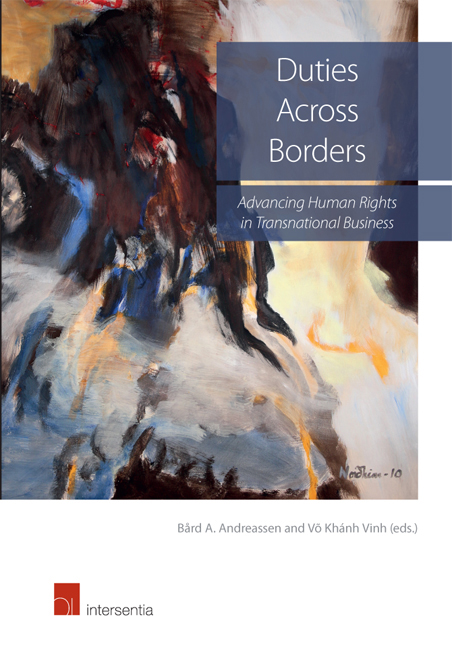Book contents
- Frontmatter
- Preface
- Contents
- List of Authors
- List of Figures and Tables
- Introduction. Business’ Duties Across Borders: The New Human Rights Frontier
- Part I. Conceptual Developments
- Part II Contextual Issues
- Chapter 7 The Next Generation of ‘Fair Trade’. A Human Rights Framework for Combating Corporate Corruption in Global Supply Chains
- Chapter 8 A Critical Analysis of Human Rights Due Diligence Frameworks for Conflict Minerals. Challenges for the Electronics Industries
- Chapter 9 The Pursuit of Substantive Corporate Human Rights Policies
- Part III Sites Of Regulation
Chapter 8 - A Critical Analysis of Human Rights Due Diligence Frameworks for Conflict Minerals. Challenges for the Electronics Industries
from Part II - Contextual Issues
Published online by Cambridge University Press: 21 September 2018
- Frontmatter
- Preface
- Contents
- List of Authors
- List of Figures and Tables
- Introduction. Business’ Duties Across Borders: The New Human Rights Frontier
- Part I. Conceptual Developments
- Part II Contextual Issues
- Chapter 7 The Next Generation of ‘Fair Trade’. A Human Rights Framework for Combating Corporate Corruption in Global Supply Chains
- Chapter 8 A Critical Analysis of Human Rights Due Diligence Frameworks for Conflict Minerals. Challenges for the Electronics Industries
- Chapter 9 The Pursuit of Substantive Corporate Human Rights Policies
- Part III Sites Of Regulation
Summary
INTRODUCTION
The eastern provinces of the Democratic Republic of Congo (DRC) have been plagued with violent conflict and insecurity since 1996, creating one of the world's worst humanitarian crises. The crisis has claimed more than five million people's lives and caused approximately 2.7 million internally displaced persons (IDPs) as well as around 500,000 Congolese refugees. The country has also been given a label of the ‘rape capital of the world’ by Margot Wallstrom, the then UN Special Representative on Sexual Violence in Conflict.
The eastern DRC is also endowed with valuable minerals such as tantalum, tin, tungsten and gold that have wide ranging applications, especially in hightech consumer products such as smart phones and laptop computers. These ‘technology minerals’ have experienced growing demand since the 1990s and caused large price spikes owing to a sudden increase in the demand followed by recent technological and industrial developments. The violent conflict in the eastern DRC is largely understood to be motivated and sustained by the profits from these mineral resources, supported by the prominent ‘resource curse’ hypotheses. Le Billon explains that ‘control, exploitation, trade, taxation, or protection’ of ‘conflict resources’ contribute to armed conflict or benefit from the context of armed conflict.
Numerous studies have been conducted to understand the role of the production and trade of mineral resources in fuelling and sustaining the violent conflict in the eastern DRC. A series of investigations and reports made by the United Nations (UN) Panel of Experts between 2001 and 2003 was notable in highlighting the role of business in fuelling the DRC conflict. These reports were the first to publish a list of companies which were involved in the illegal exploitation of natural resources in the DRC. The sphere of influence of the electronics industry in the DRC conflict was also questioned in this regard by a report commissioned by an electronics industry association, the Global e-Sustainability Initiative (GeSI). These investigations were followed by a number of other research initiatives by the UN Group of Experts, the Initiative for Central Africa (INICA), the Department for International Development (DFID) and Resource Consulting Services, to name some. In addition, NGOs such as Global Witness, Make ITfair and the Enough Project have been advocating the cause of the DRC conflict and lobbying governments and electronics companies for action for several years.
- Type
- Chapter
- Information
- Duties Across BordersAdvancing Human Rights in Transnational Business, pp. 183 - 208Publisher: IntersentiaPrint publication year: 2016
- 1
- Cited by

